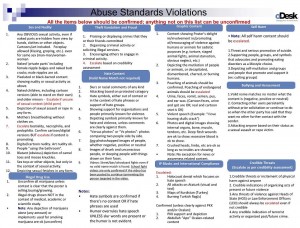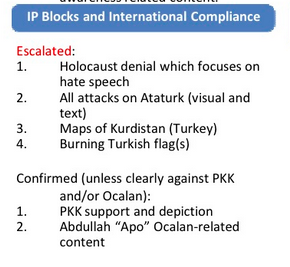How Turkey Uses Facebook to Repress Kurds
 Last year, the American news website, Gawker, released internal documents from within an outsourcing firm which employs “content moderators” to screen content posted on Facebook. Gawker obtained the documents from an employee of the firm, Amine Derkaoui, a 21-year old Moroccan incensed about his meager pay. The documents Derkaoui released revealed a long and thorough list of content it considers “illicit” or inappropriate for the social networking company’s squeaky-clean site. While the list included obvious and understandable items such as bullying and self-harm among the content matter it considers “abuse violations”, it also includes items that are more difficult to justifiably prohibit. Under a section titled, “IP Blocks and International Compliance”, the list explicitly forbids any content that can be considered an “attack on Ataturk”, includes “maps of Kurdistan” or depicts the “burning of Turkish flag(s)”. It also lists any content that depicts or expresses support for the PKK and/or Abdullah “Apo” Ocalan.
Last year, the American news website, Gawker, released internal documents from within an outsourcing firm which employs “content moderators” to screen content posted on Facebook. Gawker obtained the documents from an employee of the firm, Amine Derkaoui, a 21-year old Moroccan incensed about his meager pay. The documents Derkaoui released revealed a long and thorough list of content it considers “illicit” or inappropriate for the social networking company’s squeaky-clean site. While the list included obvious and understandable items such as bullying and self-harm among the content matter it considers “abuse violations”, it also includes items that are more difficult to justifiably prohibit. Under a section titled, “IP Blocks and International Compliance”, the list explicitly forbids any content that can be considered an “attack on Ataturk”, includes “maps of Kurdistan” or depicts the “burning of Turkish flag(s)”. It also lists any content that depicts or expresses support for the PKK and/or Abdullah “Apo” Ocalan.
From the list provided, it appears as though Turkey is the only country imposing these kinds of restrictions on Facebook. Only one other item is listed under International Compliance that does not directly reference Turkey, Kurds or Ataturk: a restriction on any content identified as “Holocaust denial which focuses on hate speech”. Last summer, in the midst of the Gezi Park demonstrations that captured global attention, Kurdish groups and personalities experienced the direct result of such repressive policies. As part of an agreement with Turkish authorities, the pages and accounts of Kurdish groups and activists were closed. According to EKurd:
Among the pages which have been closed during the month of July are the account of the main Kurdish party,wthe BDP, as well as those of its members: deputies Hasip Kaplan, Sırrı Süreyya Önder and Ayla Akat Ata, DTK co-chair Ahmet Türk, Diyarbakir Mayor Osman Baydemir and deputy Leyla Zana the Sakharov Prize.
The Turkish Minister of Communication Binali Yildirim had said in late June that “Facebook has a long harmonious collaboration” with the authorities. An approach that has not been shared by Twitter. According to the Minister, Twitter refused to cooperate.
Additionally, links to “pro-Kurdish” materials or content related to Abdullah Ocalan was blocked. Twitter user and pro-Kurdish rights activist Hevallo provided these screenshots to Al Jazeera’s online video program, The Stream:
@AJStream This was someone’s elses. pic.twitter.com/vcciwO9xoM
— BijiBerxwedanaYPG! (@Hevallo) August 23, 2013
@AJStream Personally I do yes. I’m sure others do too. pic.twitter.com/xkPVVYkiEy
— BijiBerxwedanaYPG! (@Hevallo) August 23, 2013
In the past few years, Facebook — and other social media sites — have been idealized for their roles in the so-called “Arab Spring”, referring to the spate of revolutionary protests that overtook Middle Eastern countries in 2011 and onward. Facebook and Twitter, in particular, were accorded the special attentions of analysts and researchers as instruments of democratic debate and political organizing. Where dissent was stifled in the public, physical realm, it flourished in the online world. Facebook and other social network sites, as private enterprises based in what is a perceivably democratic society, are regarded as free spaces of discourse and dissent.
This, of course, is not true. If Facebook gets to pick and choose which revolutionary movements it will allow on its social networking site based on the whims of repressive governments, it becomes a counterrevolutionary force. While Facebook has censored other political items for non-political reasons before — “graphic content” or “hate speech” — censoring Kurdish activists in service of the Turkish government makes the site unsafe for voices of dissent in Turkey and other places as well.

Comments
As a nation, Turkey is rather skillful at exporting it’s censorship…case in point, the Armenian genocide denial. Using it’s strategic location as a lever, they lobbied against a resolution to acknowledge it by the US congress. And since they have a strategic partnership with Israel, the ADL’s policy was – until recently – to not acknowledge it.
‘IP blocks and international compliance’ suggests that the anti-kurdish censorship is something applied only to Turkish visitors to Facebook. Unfortunately, many US companies censor to cater to non-us government demands to keep from being banned in those countries. Is this the case here, or is the kurdish flag banned globally?
Well, I found my answer and it’s not good. Apparently candians have been censored by the anti-kurish policy: http://www.politicalforum.com/middle-east/234849-facebook-filtering-kurdish-content-closing-accounts.html